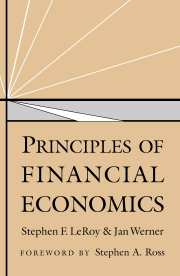Book contents
- Frontmatter
- Contents
- Foreword
- Preface
- Part One Equilibrium and Arbitrage
- Part Two Valuation
- Part Three Risk
- Part Four Optimal Portfolios
- Part Five Equilibrium Prices and Allocations
- Part Six Mean-Variance Analysis
- 17 The Expectations and Pricing Kernels
- 18 The Mean-Variance Frontier Payoffs
- 19 Capital Asset Pricing Model
- 20 Factor Pricing
- Part Seven Multidate Security Markets
- Part Eight Martingale Property of Security Prices
- Index
18 - The Mean-Variance Frontier Payoffs
Published online by Cambridge University Press: 05 September 2012
- Frontmatter
- Contents
- Foreword
- Preface
- Part One Equilibrium and Arbitrage
- Part Two Valuation
- Part Three Risk
- Part Four Optimal Portfolios
- Part Five Equilibrium Prices and Allocations
- Part Six Mean-Variance Analysis
- 17 The Expectations and Pricing Kernels
- 18 The Mean-Variance Frontier Payoffs
- 19 Capital Asset Pricing Model
- 20 Factor Pricing
- Part Seven Multidate Security Markets
- Part Eight Martingale Property of Security Prices
- Index
Summary
Introduction
Although variance does not in general provide an accurate measure of risk (see Chapter 10), the analysis of expected returns and variances of returns plays an important role in the theory and applications of finance. Such analysis leads to identification of returns that have minimal variance for a given expected return.
The analysis relies on Hilbert space methods developed in Chapter 17 – in particular, on the representations of the payoff pricing functional by the pricing kernel and the expectations functional by the expectations kernel. The returns that attain minimum variance for a given expected return lie on a line passing through the returns on the pricing kernel and the expectations kernel. The analysis of expected returns and variances of returns has a simple diagrammatic representation.
Mean-Variance Frontier Payoffs
A payoff is a mean-variance frontier payoff if there is no other payoff with the same price and the same expectation but a smaller variance. In other words, the mean-variance frontier payoffs minimize variance subject to constraints on price and expectation.
Let ε be the subspace of M spanned by the expectations kernel ke and the pricing kernel kq. The central result of this chapter is the following:
Theorem 18.2.1A payoff is a mean-variance frontier payoff iff it lies in the span of the expectations kernel and the pricing kernel.
Proof: Taking the orthogonal projection (with respect to the expectations inner product) of an arbitrary payoff z ∈ M onto ε results in
with zε ∈ ε and ∊ ∈ ε⊥.
- Type
- Chapter
- Information
- Principles of Financial Economics , pp. 183 - 193Publisher: Cambridge University PressPrint publication year: 2000



